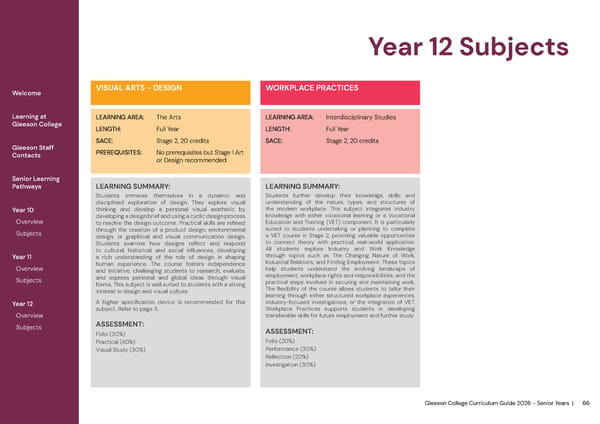Gleeson College Curriculum Guide 2026 - Senior Years | 66 Year 12 Subjects Welcome Learning at Gleeson College Gleeson Staff Contacts Senior Learning Pathways Year 10 Overview Subjects Year 11 Overview Subjects Year 12 Overview Subjects LEARNING SUMMARY: Students immerse themselves in a dynamic and disciplined exploration of design. They explore visual thinking and develop a personal visual aesthetic by developing a design brief and using a cyclic design process to resolve the design outcome. Practical skills are refined through the creation of a product design, environmental design, or graphical and visual communication design. Students examine how designs reflect and respond to cultural, historical, and social influences, developing a rich understanding of the role of design in shaping human experience. The course fosters independence and initiative, challenging students to research, evaluate, and express personal and global ideas through visual forms. This subject is well suited to students with a strong interest in design and visual culture. A higher specification device is recommended for this subject. Refer to page 5. ASSESSMENT: Folio (30%) Practical (40%) Visual Study (30%) VISUAL ARTS - DESIGN LEARNING AREA: The Arts LENGTH: Full Year SACE: Stage 2, 20 credits PREREQUISITES: No prerequisites but Stage 1 Art or Design recommended WORKPLACE PRACTICES LEARNING AREA: Interdisciplinary Studies LENGTH: Full Year SACE: Stage 2, 20 credits LEARNING SUMMARY: Students further develop their knowledge, skills, and understanding of the nature, types, and structures of the modern workplace. This subject integrates industry knowledge with either vocational learning or a Vocational Education and Training (VET) component. It is particularly suited to students undertaking or planning to complete a VET course in Stage 2, providing valuable opportunities to connect theory with practical, real-world application. All students explore Industry and Work Knowledge through topics such as The Changing Nature of Work, Industrial Relations, and Finding Employment. These topics help students understand the evolving landscape of employment, workplace rights and responsibilities, and the practical steps involved in securing and maintaining work. The flexibility of the course allows students to tailor their learning through either structured workplace experiences, industry-focused investigations, or the integration of VET. Workplace Practices supports students in developing transferable skills for future employment and further study. ASSESSMENT: Folio (20%) Performance (30%) Reflection (20%) Investigation (30%)
 2026 Gleeson College Senior Years Curriculum Guide 2026 Page 65 Page 67
2026 Gleeson College Senior Years Curriculum Guide 2026 Page 65 Page 67